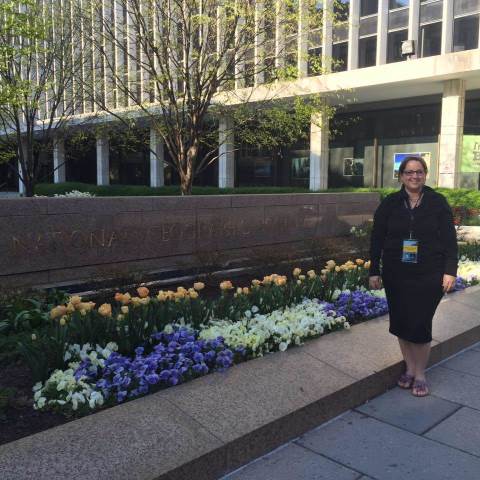

I spent April 14-17 in Washington, D.C. at the National Geographic Headquarters with 34 other 2016 National Geographic and Lindblad Expeditions Grosvenor Teacher Fellows, naturalists, photographers and Google Geo experts. This professional development workshop was the training component to the expedition I will go on in October to the Galapagos Islands.
Five takeaways from my training:
1. Storytelling is a human experience. We all love stories – we love hearing them, we love telling them, we love being a part of them. I’ve loved learning about National Geographic Fellow Paul Salopek’s storytelling journey this year as part of the Project Zero Out of Eden Learn curriculum. I was introduced to John Francis, the planetwalker, this week – a man who spent 17 years in silence while foregoing motorized automobiles. These two reinforce the importance of being deliberate and present, a lesson that can never be learned too early.
2. Use Google for Good. John Bailey, program manager for Google Geo Education, led two sessions on Google Earth’s outreach program. We learned about 360 photospheres and videos in order to make use of the Ricoh Thetas that will be on board our expeditions. During John’s presentation, he shared examples of journalists using Google’s geobrowsing apps for telling stories that eventually led to change. This inspired me to think about how our Dar News media students could use the same apps to tell stories that affect change in our local community. I look forward to collaborating with other Darlington educators in identifying how we might do this. While Google has a News Lab fellowship for college students to learn how to harness the Google technology in their storytelling, it would be great for our students to begin utilizing these tools during their Darlington career.
3. Map. Google Earth has been expanding to include user’s submitted photospheres to help map our world. Currently our Darlington map doesn’t include any photospheres. I’d like to change that, having our journalism students create 360° photospheres to contribute to Darlington’s map as well as the maps of our Greater Rome community. I hope to get our Girl Scout Troop involved as well.
4. Use National Geographic Education. As part of my experience as a fellow, I am required to contribute a lesson for the National Geographic Education page. If you are an educator, check out this resource for inspirational lessons/activities to invigorate your classroom. Here’s an activity from a former colleague of mine who was recently featured as one of National Geographic's educators of the week (and was also in one of our training presentations this weekend). National Geographic has also just launched a certification program for educators if you’d like to delve into professional development. I’ll be completing this certification as part of my fellowship.
5. Less is More. During our photography lessons, we were encouraged to not feel pressured to capture everything and to look for that one shot that captures our story when we go through our photos. But don't delete images on your camera because you are actually just deleting the shortcut to the photo but not the actual data itself. One of the National Geographic photographers shared that tip. Instead, download all images to your laptop and reformat your memory card after each photo session. We also learned that as we try to convey our experience as a Grosvenor Fellow to others, brevity is key. So with that, I'll stop.